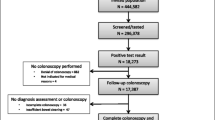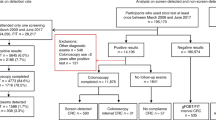Abstract
Background
Immunochemical tests show important advantages over chemical-based faecal occult blood tests (FOBT) for colorectal cancer (CRC) screening, but comparison studies are limited. This study was performed to compare the accuracy of a sensitive immunochemical test with the guaiac test for detecting significant neoplasia (advanced adenomas and CRC) in an average-risk population.
Methods
A random sample of 2288 asymptomatic subjects 50–79 years of age was prospectively included. Participants received three cards of the guaiac test, one sample of a latex-agglutination test (haemoglobin cut-off 50 ng/ml), and an invitation to undergo colonoscopy. Test sensitivity, specificity, and positive and negative predictive values (PPV and NPV) were calculated in 1756 compliers.
Results
Immunochemical and guaiac tests were positive in 143 (8.1%) and 62 (3.5%) subjects, respectively. Complete colonoscopy, performed in 402 participants (158 FOBT+ and 244 FOBT−), detected 14 (0.8%) patients with CRC and 49 (2.8%) with advanced adenomas. The immunochemical and guaiac tests for significant colorectal neoplasia showed sensitivities of 61% versus 23.8%, specificities of 95.1% versus 97.7%, PPVs of 43.4% versus 39.0%, and NPVs of 97.5% versus 95.4%, respectively. Proximal significant neoplasms were more frequently detected with the immunochemical test (85% vs. 15%) The relative risk for detecting significant neoplasia was superior in patients with a positive immunochemical test (RR 16.93; CI 7.94–36.10) than with a positive guaiac test (RR 3.34; CI 2.17–5.15).
Conclusion
A sensitive immunochemical test is markedly superior to the guaiac test for detecting significant colorectal neoplasia, and should be considered the first-choice FOBT for CRC screening in the average-risk population.

Similar content being viewed by others
References
Keighley MR. Gastrointestinal cancers in Europe. Aliment Pharmacol Ther. 2003;18(Suppl 3):7–30.
Hardcastle JD, Chamberlain JO, Robinson MH, Moss SM, Amar SS, Balfour TW, et al. Randomised controlled trial of faecal-occult-blood screening for colorectal cancer. Lancet. 1996;348:1472–7.
Kronborg O, Jorgensen OD, Fenger C, Rasmussen M. Randomized study of biennial screening with a faecal occult blood test: results after nine screening rounds. Scand J Gastroenterol. 2004;39:846–51.
Mandel JS, Bond JH, Church TR, Snover DC, Bradley GM, Schuman LM, et al. Reducing mortality from colorectal cancer by screening for fecal occult blood Minnesota Colon Cancer Control Study. N Engl J Med. 1993;328:1365–71.
Faivre J, Dancourt V, Lejeune C, Tazi MA, Lamour J, Gerard D, et al. Reduction in colorectal cancer mortality by fecal occult blood screening in a French controlled study. Gastroenterology. 2004;126:1674–80.
Mandel JS, Church TR, Bond JH, Ederer F, Geisser MS, Mongin SJ, et al. The effect of fecal occult-blood screening on the incidence of colorectal cancer. N Engl J Med. 2000;343:1603–7.
Young GP, St John DJ, Winawer SJ, Rozen P. Choice of fecal occult blood tests for colorectal cancer screening: recommendations based on performance characteristics in population studies: a WHO (World Health Organization) and OMED (World Organization for Digestive Endoscopy) report. Am J Gastroenterol. 2002;97:2499–507.
Young GP. Screening for colorectal cancer: alternative faecal occult blood tests. Eur J Gastroenterol Hepatol. 1998;10:205–12.
Guittet L, Bouvier V, Mariotte N, Vallee JP, Arsene D, Boutreux S, et al. Comparison of a guaiac based and an immunochemical faecal occult blood test in screening for colorectal cancer in a general average risk population. Gut. 2007;56:210–4.
Hoepffner N, Shastri YM, Hanisch E, Rosch W, Mossner J, Caspary WF, et al. Comparative evaluation of a new bedside faecal occult blood test in a prospective multicentre study. Aliment Pharmacol Ther. 2006;23:145–54.
Levi Z, Rozen P, Hazazi R, Vilkin A, Wakef A, Maoz E, et al. Can quantification of faecal occult blood predetermine the need for colonoscopy in patients at risk for non-syndromic familial colorectal cancer? Aliment Pharmacol Ther. 2006;24:1475–81.
Vilkin A, Rozen P, Levi Z, Waked A, Maoz E, Birkenfeld S, et al. Performance characteristics and evaluation of an automated-developed and quantitative, immunochemical, fecal occult blood screening test. Am J Gastroenterol. 2005;100:2519–25.
Nakajima M, Saito H, Soma Y, Sobue T, Tanaka M, Munakata A. Prevention of advanced colorectal cancer by screening using the immunochemical faecal occult blood test: a case–control study. Br J Cancer. 2003;89:23–8.
Allison JE, Tekawa IS, Ransom LJ, Adrain AL. A comparison of fecal occult-blood tests for colorectal-cancer screening. N Engl J Med. 1996;334:155–9.
Imperiale TF, Ransohoff DF, Itzkowitz SH, Turnbull BA, Ross ME. Fecal DNA versus fecal occult blood for colorectal-cancer screening in an average-risk population. N Engl J Med. 2004;351:2704–14.
Allison JE, Sakoda LC, Levin TR, Tucker JP, Tekawa IS, Cuff T, et al. Screening for colorectal neoplasms with new fecal occult blood tests: update on performance characteristics. J Natl Cancer Inst. 2007;99:1462–70.
Castiglione G, Grazzini G, Ciatto S. Guaiac and immunochemical tests for faecal occult blood in colorectal cancer screening. Br J Cancer. 1992;65:942–4.
van Rossum LG, van Rijn AF, Laheij RJ, van Oijen MG, Fockens P, van Krieken HH, et al. Random comparison of guaiac and immunochemical fecal occult blood tests for colorectal cancer in a screening population. Gastroenterology. 2008;135:82–90.
Hol L, Wilschut JA, van Ballegooijen M, van Vuuren AJ, van der Valk H, Reijerink JC, et al. Screening for colorectal cancer: random comparison of guaiac and immunochemical faecal occult blood testing at different cut-off levels. Br J Cancer. 2009;100:1103–10.
Guittet L, Bouvier V, Mariotte N, Vallee JP, Levillain R, Tichet J, et al. Comparison of a guaiac and an immunochemical faecal occult blood test for the detection of colonic lesions according to lesion type and location. Br J Cancer. 2009;100:1230–5.
Parra-Blanco A, Nicolas-Perez D, Gimeno-Garcia A, Grosso B, Jimenez A, Ortega J, et al. The timing of bowel preparation before colonoscopy determines the quality of cleansing, and is a significant factor contributing to the detection of flat lesions: a randomized study. World J Gastroenterol. 2006;12:6161–6.
Fujii T, Hasegawa RT, Saitoh Y, Fleischer D, Saito Y, Sano Y, et al. Chromoscopy during colonoscopy. Endoscopy. 2001;33:1036–41.
Diamond GA. Reverend Bayes’ silent majority. An alternative factor affecting sensitivity and specificity of exercise electrocardiography. Am J Cardiol. 1986;57:1175–80.
Leiner S. Verification bias in screening for prostate cancer. N Engl J Med. 2003;349:1672–3.
Kosinski AS, Barnhart HX. A global sensitivity analysis of performance of a medical diagnostic test when verification bias is present. Stat Med. 2003;22:2711–21.
Murphy JR. The relationship of relative risk and positive predictive value in 2 × 2 tables. Am J Epidemiol. 1983;117:86–9.
Hewitson P, Glasziou P, Irwig L, Towler B, Watson E. Screening for colorectal cancer using the faecal occult blood test, hemoccult. Cochrane Database Syst Rev. 2007;1:CD001216.
Castiglione G, Sala P, Ciatto S, Grazzini G, Mazzotta A, Rossetti C, et al. Comparative analysis of results of guaiac and immunochemical tests for faecal occult blood in colorectal cancer screening in two oncological institutions. Eur J Cancer Prev. 1994;3:399–405.
Castiglione G, Zappa M, Grazzini G, Mazzotta A, Biagini M, Salvadori P, et al. Immunochemical vs guaiac faecal occult blood tests in a population-based screening programme for colorectal cancer. Br J Cancer. 1996;74:141–4.
Dancourt V, Lejeune C, Lepage C, Gailliard MC, Meny B, Faivre J. Immunochemical faecal occult blood tests are superior to guaiac-based tests for the detection of colorectal neoplasms. Eur J Cancer. 2008;44:2254–8.
Morikawa T, Kato J, Yamaji Y, Wada R, Mitsushima T, Shiratori Y. A comparison of the immunochemical fecal occult blood test and total colonoscopy in the asymptomatic population. Gastroenterology. 2005;129:422–8.
Zappa M, Castiglione G, Paci E, Grazzini G, Rubeca T, Turco P, et al. Measuring interval cancers in population-based screening using different assays of fecal occult blood testing: the District of Florence experience. Int J Cancer. 2001;92:151–4.
Smith A, Young GP, Cole SR, Bampton P. Comparison of a brush-sampling fecal immunochemical test for hemoglobin with a sensitive guaiac-based fecal occult blood test in detection of colorectal neoplasia. Cancer. 2006;107:2152–9.
Hol L, Van Leerdam ME, Van Ballegooijen M, Van Vuuren AJ, Van Dekken H, Reijerink JC, et al. Screening for colorectal cancer; randomised trial comparing guaiac-based and immunochemical faecal occult blood testing and flexible sigmoidoscopy. Gut. 2010;59:62–68.
Lieberman DA, Weiss DG, Bond JH, Ahnen DJ, Garewal H, Chejfec G. Use of colonoscopy to screen asymptomatic adults for colorectal cancer. Veterans Affairs Cooperative Study Group 380. N Engl J Med. 2000;343:162–8.
Levi Z, Rozen P, Hazazi R, Vilkin A, Waked A, Maoz E, et al. A quantitative immunochemical fecal occult blood test for colorectal neoplasia. Ann Intern Med. 2007;146:244–55.
Subramanian S, Klosterman M, Amonkar MM, Hunt TL. Adherence with colorectal cancer screening guidelines: a review. Prev Med. 2004;38:536–50.
Gimeno-Garcia AZ, Quintero E, Nicolas-Perez D, Parra-Blanco A, Jimenez-Sosa A. Impact of an educational video-based strategy on the behavior process associated with colorectal cancer screening: a randomized controlled study. Cancer Epidemiol. 2009;33:216–22.
Irwig L, Bossuyt P, Glasziou P, Gatsonis C, Lijmer J. Designing studies to ensure that estimates of test accuracy are transferable. BMJ. 2002;324:669–71.
Acknowledgments
The authors wish to thank the participating patients, and the Staff of the Endoscopy Unit, University Hospital of the Canary Islands. They also thank Raquel Aguiar and Dr. Yasushi Sano for critical comments on the manuscript and Eiken Chemical Corp. for providing the OC-Light kits. This study was supported in part by grants from the Instituto de Salud Carlos III (C03/02), from the Consejería de Educación, Cultura y Deportes, Gobierno de Canarias (PI2002/138), and from the Fundación Canaria de Investigación (FUNCIS) (P21/02).
Author information
Authors and Affiliations
Corresponding author
Additional information
A. Parra-Blanco and A. Z. Gimeno-García contributed equally to this work.
Rights and permissions
About this article
Cite this article
Parra-Blanco, A., Gimeno-García, A.Z., Quintero, E. et al. Diagnostic accuracy of immunochemical versus guaiac faecal occult blood tests for colorectal cancer screening. J Gastroenterol 45, 703–712 (2010). https://doi.org/10.1007/s00535-010-0214-8
Received:
Accepted:
Published:
Issue Date:
DOI: https://doi.org/10.1007/s00535-010-0214-8




